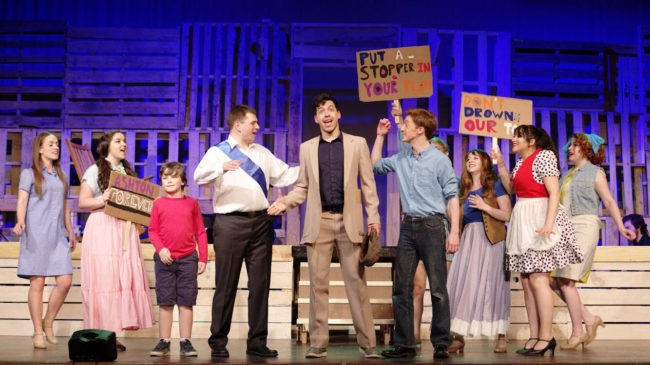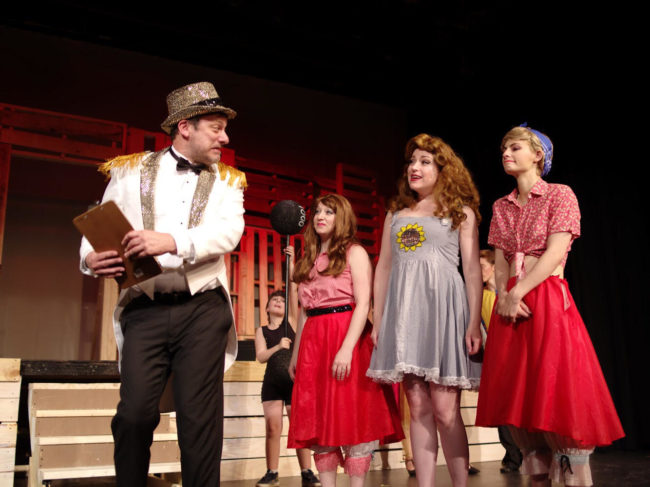Who among us is not guilty of embellishing a story here and there? Whether exaggerating about our feats of derring-do, or adding a few inches to that fish we caught when we were a child, stories have a way of taking on a life of their own when we tell them. In this case, there is “Magic in the Man” through the larger-than life stories Edward Bloom tells his young son. But all children must grow up, and imagination battles mundane-reality in a son’s quest to understand his father and the fanciful tales he weaves through Silhouette Stages’ Big Fish. Closing out the musical portion of Silhouette Stages’ 2017-2018 season, Big Fish reels in its audience with tales of adventure and extraordinary circumstances. Based on Daniel Wallace’s 1998 novel, and 2003 Tim Burton film of the same name, Big Fish delights with its fanciful-meets-folksy musical charm composed by Andrew Lippa. Directed by TJ Lukacsina with Musical Direction by Michael Tan, audiences will be whisked away to a world they’ve never experienced before through the extraordinary tales of a traveling salesman.

The true magic of this production starts with the work of Set Designer Alex Porter and Properties Designers Ande Kolp and Lauren Tobiason. Together, they have created a space through the set’s elegant-simplicity which allows the characters on stage the chance to paint a larger-than-life picture through their words, props, and choreography. Alone, the pallet-based construct of the set is enough to give the audience a sense of the mundane plainness of the matter-of-fact worldview of our hero’s adult son, Will, played by Michael Nugent. But the magic truly shines as his father’s stories unfold around them as the other actors form the scene of a flooding valley or a fierce dragon with only a few simple fabric pieces, and one ferocious snapping folding chair.
And on the note of fabric, Costume Designer Jaqueline Maranville accomplishes wonders with costuming the cast over the course of two generations; and two different realities. The audience is able to travel back and forth in time with the characters, as well as from here and now to the fanciful embellishments of Edward’s tales with the use of brighter colors in the past, and muted colors in the present. Every character’s outfit immediately conveys their identify in the story; whether they be a mermaid, an aspiring singer, a witch, or a giant. One piece which is an absolute delight is the costume of the Mermaid, played by Emily Machovec. While at first it appears to be a flowy long dress, Machovec fluidly transitions from woman to mermaid with a careful flick of her wrist which shapes the flowy skirt into a fin’s form.
While there are not many instances of sound effects outside of the actions of the cast onstage, Sound Effects Designer Brent Tomchik does well with what is used to enhance the events depicted. One scene worth noting for its subtle elegance is the bedroom scene in Act II. The sound of the rain as it hits the roof does nothing to distract from the scene being played on stage, and everything to further add to the atmosphere. Likewise, Lighting Designer Lana Riggins does well to transition the scenes to their appropriate locations in the span of the story unfolding.

For all the sights onstage, it is the orchestra that shines the brightest. Led by Musical Director Michael Tan, the members of the orchestra are so on-point it is often easy to forget that there are real-live people playing behind the set, and not an audio recording playing in the background. Tan expertly leads the orchestra in keeping pace with the actors. While there were a few instances of singers falling behind or jumping ahead of the music, the orchestra was able to adjust as needed so effortlessly that any bumbles were quickly forgotten. Scene transitions were especially charming as the musicians create an atmosphere so lovely, the audience feels like they get a show and a mini concert all in one evening.
Director TJ Lukacsina takes on some challenging transitions in this production as the story is constantly shifting from present, to past, and all the embellishments in-between. Coupled with the overarching theme of a son trying to understand his father, Lukacsina does well to mind the pacing of the show so that scenes seamlessly flow from one into the other, as well as mindfully integrate Will’s presence into the rendering of his father’s tall-tales as he attempts to make sense of the unsensible.
Lukacsina also excels at utilizing the ensemble to its utmost efficiency. His use of placement with the cast throughout the production kept the action onstage both visually appealing and engaging all throughout the story. Likewise, the well-organized use of blocking and spacing allowed the stage to feel full without seeming crowded, while also allowing the actors adequate space to execute ensemble set building for some of the more fanciful imagery. This was displayed strongest in the piece “Fight the Dragon” where the cast, surprise, surprise, created a very impressive dragon using only themselves, two flags for wings, and the aforementioned snapping folding chair.
But while there are many wonderful aspects of this production, the show’s main issues come largely from the lack of synchronization in several of the production’s more dance-related numbers. While Choreographer Rikki Lacewell did well with the overall choreography of the show, there are a few instances where the cast needs to be in sync and gives the impression they need to rehearse together in front of a mirror a few more times before performing. This was especially true in the ensemble stomping portion of “Be the Hero” and the transitions from “Little Lamb from Alabama” into “Time Stops.” While the heart of the dance is there, there are several performers whose energy and timing out steps that of their fellow dancers, making for more of a distraction than well-executed number.

Luis “Matty” Montes takes on a great challenge of portraying the show’s patriarch and storyteller extraordinaire, Edward Bloom. While Montes shines as the younger version of his character, he seems to struggle with seamlessly transitioning to his older self; often giving the impression that Montes simply does not yet know from experience how old age affects the body. However, when it comes to saving the day, befriending the mythical beings along the way, and winning the woman of his dreams, there is no question that Montes’ Edward is an extraordinary person worthy of admiration from the characters around him. Montes does well at making his character charming and lovable, and at no time does the audience believe that Edward is anything less than amazing; even if his son has doubts.
On the other side of the coin, Edward’s adult son Will Bloom, played by Michael Nugent, does exceptionally well at conveying the “just the facts, please” bluntness of his character. While Will’s character is written to be the unexciting and realistic yin to Edward’s whimsical and fanciful yang, Nugent expertly walks the line of playing the doubting naysayer while still eliciting some sympathy from the audience. Nugent’s performance allows the audience to tag along on his journey from seeing his father’s tales as fanciful exaggerations, to realizing the true purpose of these stories is not just about telling the events; but of loving the beauty and wonder in our experiences and how we share this with others through the stories we tell.

Keeping it in the family, Emily Mudd portrays Edward’s loving and devoted wife, Sandra Bloom. While Mudd’s talents seem to be underutilized with the limited dimensions given to her character, Mudd more than makes up for this with her singing. “I Don’t Need a Roof” proved to be the strongest number of the performance, not only for its excellent execution with Mudd’s lovely and powerful voice, but also for the emotional connection between Mudd and Montes, and the weighty reality of their eventual parting in the days to come.
Be sure to watch out for Emily Alvarado’s portrayal of the Witch and her trees-turned-Witches coven. Alvarado gives such a powerful and strong performance of “I Know What You Want,” it’s disappointing that she never gets another chance to shine. Nevertheless, her singular performance is a memorable one as she gives the power needed to command the song and place the audience under her spell.
Running Time: 2 hours and 30 minutes with one intermission.
Big Fish plays through Sunday, May 27, 2018 at Silhouette Stages performing at Slayton House Theatre in Wilde Lake Village Center— 10400 Cross Fox Lane, in Columbia, MD. For tickets, call the box office at (410) 637-5289, or purchase them online.



